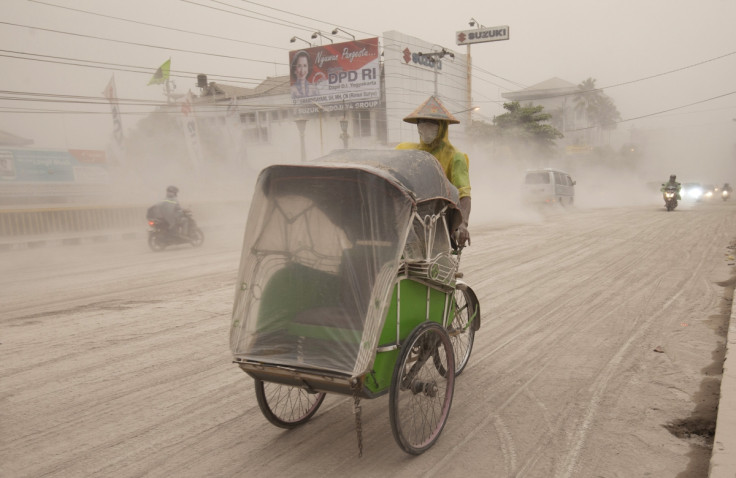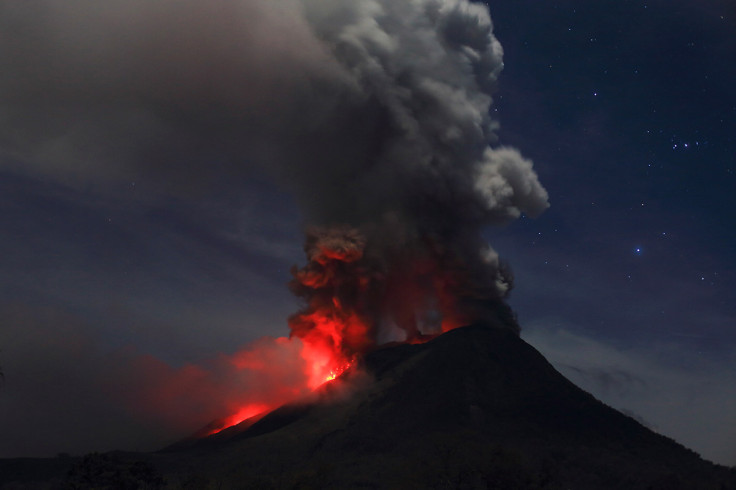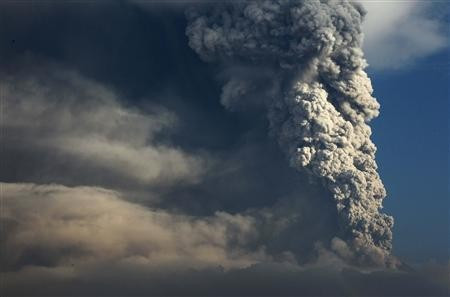Mount Kelud: Why Are Indonesia's Volcanoes Erupting?

A volcanic eruption of Mount Kelud on Indonesia's Java Island sparked a mass evacuation of over 200,000 people, with two reportedly dead following the blast.
Kelud sent a plume of ash 17 kilometres into the air. Muhammad Hendrasto, head of the country's volcano monitoring agency, said the volcano is spewing lava and that gravel rain is falling.
The latest eruption follows a string of volcanic headline news from Indonesia. Mount Sinabung, on Sumatra, has been erupting since September, while Mount Merapi, on Java, also erupted in November.
But is there any significance to this apparent increase in activity from the "Ring of Fire"? Dr Colin Macpherson, from the Department of Earth Sciences at the University of Durham, says not.
Speaking of Kelud, Macpherson told IBTimes UK that it has erupted eight or nine times over the last 100 years, with the latest incident being the second this century. In 2007 there was a "very minor" eruption that authorities could not confirm until after the event because of cloud cover: "This is the first time there's been an explosive eruption since about 1990," he said.
"All of the volcanoes in Java – and there are a lot of them; Java is one of the most volcanic islands on the planet – they all have the capacity to produce small eruptions, but they also have the potential to produce dangerous explosive eruptions.

"The activity in 2007 suggests that some magma may have been in place in upper parts of the volcano, slowly cooling since then, and it might just take the addition of a small amount of new material to cause a more explosive eruption of the stuff that's been ponding in the upper parts of the volcano for a while. Without knowing the cycle of seismic activity associated with this it's difficult to be precise though."
Macpherson said there is no way of telling if Kelud will continue to erupt. Experts have very short observational records of volcanoes in comparison to their lifespan, which can stretch for hundreds of thousands of years: "The activity may only come in bursts of a few days every few tens or hundreds of years. It's very difficult for us to use what records we have to make predictions going forward."
He said volcanic activity and eruptions in Indonesia are commonplace, and, at any one time there are around a dozen volcanoes that are actively erupting.
"The reason we don't hear more news about Indonesian volcanoes is that many are in remote areas, but in Java, which is one of the most densely populated islands in the world, there's huge numbers of people living near to a lot of volcanoes.
"Close to Kelud you have a number of big cities and when you've got an explosive eruption like this with lots of ash, it has an impact on these large population centres. [However] it's not unusual to see so much activity, or to see two big eruptions going on in Indonesia at the same time. That's not abnormal."
Macpherson said in weekly updates issued by the Smithsonian Institute in Washington DC, Kelud had listed small volcanoes or puffs of smoke, but that this is not a real indication of an eruption. "For every one of those that goes on to be an eruption of this sort, there are a dozen where nothing happens."
Following a recent eruption at Sinabung, the National Disaster Mitigation Agency in Indonesia placed 19 volcanoes, including Kelud, on alert. This, he said, is not an indication that all the volcanoes in Indonesia are preparing to erupt, but rather authorities will need to manage their disaster resources in the event of another eruption.

"With Sinabung and Kelud erupting, they may be putting Indonesian authorities on alert because they're going to have to devote a lot of resources to managing what's going on in those two areas. If anywhere else becomes active, they're going to have a lot on their plate.
"If we do see the beginnings of activity elsewhere, they will have to think very carefully about what resources they have and what resources they might have to ask the international community to assist with.
"It may be that some of the other volcanoes on this list become active and that may be on the basis of ground activity being above normal, but I don't think at the moment there is a clear indication that there's' going to be another big eruption. But as I say, we've got a poor observational record to go on.
"There's no precedence for large numbers of volcanoes in small regions, which is what Java is, to all start erupting at once.
"Indonesia has a heck of a lot of volcanoes so it's to be expected that at any one time there's going to be activity in more than one part of the country."
© Copyright IBTimes 2025. All rights reserved.






















